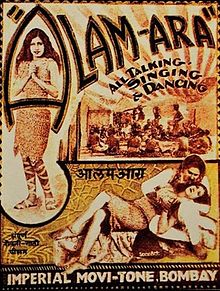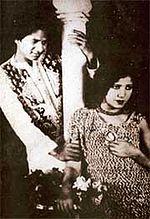Alam Ara: Difference between revisions
m →top: http→https for Google Books and Google News using AWB |
Rescuing 1 sources and tagging 0 as dead. #IABot (v1.2.4) |
||
| Line 44: | Line 44: | ||
[[Image:AlamAra.jpg|thumb|left|200px|A scene from ''Alam Ara'']] |
[[Image:AlamAra.jpg|thumb|left|200px|A scene from ''Alam Ara'']] |
||
Both the movie and its music were widely successful,<ref name=tri/> including the hit song "De de khuda ke naam per", which was also the first song of the Indian cinema. It was sung by actor [[Wazir Mohammed Khan]] who played a ''[[fakir]]'' in the film.<ref name=tri/><ref>{{cite web|title=Preview: Indian cinema’s first talkie completes 80 years|url=http://ticketplease.com/news/bollywood_movie/story/Indian_cinema_s_first_talkie_completes_80_years.aspx|publisher=Ticket Please News Desk|accessdate=14 March 2011}}</ref> As [[Playback singer|playback singing]] had yet to start in Indian cinema, it was recorded live with musical accompaniment of a harmonium and a tabla.<ref>[http://www.saregama.com/magezine_html/Issue1/ourArchives-Alam.htm Alam Ara, first song] Archives, www.saregama.com</ref> |
Both the movie and its music were widely successful,<ref name=tri/> including the hit song "De de khuda ke naam per", which was also the first song of the Indian cinema. It was sung by actor [[Wazir Mohammed Khan]] who played a ''[[fakir]]'' in the film.<ref name=tri/><ref>{{cite web|title=Preview: Indian cinema’s first talkie completes 80 years |url=http://ticketplease.com/news/bollywood_movie/story/Indian_cinema_s_first_talkie_completes_80_years.aspx |publisher=Ticket Please News Desk |accessdate=14 March 2011 |deadurl=yes |archiveurl=https://web.archive.org/web/20110717055225/http://ticketplease.com/news/bollywood_movie/story/Indian_cinema_s_first_talkie_completes_80_years.aspx |archivedate=17 July 2011 |df=dmy }}</ref> As [[Playback singer|playback singing]] had yet to start in Indian cinema, it was recorded live with musical accompaniment of a harmonium and a tabla.<ref>[http://www.saregama.com/magezine_html/Issue1/ourArchives-Alam.htm Alam Ara, first song] Archives, www.saregama.com</ref> |
||
The film marked the beginning of [[filmi]] music in the [[Cinema of India]], as noted film director [[Shyam Benegal]] said, "It was not just a talkie. It was a talking and singing film with more singing and less talking. It had a number of songs and that actually set the template for the kind of films that were made later".<ref name=sil>{{cite web|title=India's first talkie lost in silence|url=http://ibnlive.in.com/news/indias-first-talkie-lost-in-silence/36005-8.html|publisher=[[IBN Live]]|accessdate=24 May 2012|date=15 June 2007}}</ref> In fact, the 1932 film ''Indrasabha'' had an overwhelming 71 songs in it.<ref>http://www.bollywood.com/node/495</ref> |
The film marked the beginning of [[filmi]] music in the [[Cinema of India]], as noted film director [[Shyam Benegal]] said, "It was not just a talkie. It was a talking and singing film with more singing and less talking. It had a number of songs and that actually set the template for the kind of films that were made later".<ref name=sil>{{cite web|title=India's first talkie lost in silence|url=http://ibnlive.in.com/news/indias-first-talkie-lost-in-silence/36005-8.html|publisher=[[IBN Live]]|accessdate=24 May 2012|date=15 June 2007}}</ref> In fact, the 1932 film ''Indrasabha'' had an overwhelming 71 songs in it.<ref>http://www.bollywood.com/node/495</ref> |
||
Revision as of 04:23, 7 October 2016
| Alam Ara | |
|---|---|
 Theatrical release poster | |
| Directed by | Ardeshir Irani |
| Written by | Joseph David Munshi Zaheer (Urdu) |
| Produced by | Imperial Movietone |
| Starring | Master Vithal Zubeida Jilloo Sushila Prithviraj Kapoor |
| Cinematography | Wilford Deming Adi M. Irani |
| Edited by | Ezra Mir |
| Music by | Ferozshah M. Mistri B. Irani |
Release date | 14 March 1931 |
Running time | 124 mins |
| Country | British India (Now India & Pakistan) |
| Language | Urdu |
| Budget | ₹390 million (US$4.7 million)(Adjusted) |
| Box office | ₹2.89 billion (US$35 million) (Adjusted) |
Alam Ara (Hindi: आलम आरा, Urdu: عالم آراء, translation: The Ornament of the World) is a 1931 Indian Bollywood Hindi/Urdu film directed by Ardeshir Irani. It was the first Indian sound film.[1][2]
Irani recognised the importance that sound would have on the cinema, and raced to complete Alam Ara before several contemporary sound films. Alam Ara debuted at the Majestic Cinema in Mumbai (then Bombay) on 14 March 1931. The first Indian talkie was so popular that "police aid had to be summoned to control the crowds."[3]
The film has long been lost and was not available as far back as 1967 according to the National Film Archive of India, Pune.[4]
Plot


The film is a love story between a prince and a gypsy girl, based on a Parsi play written by Joseph David. David later served as a writer at Irani's film company. The story centres on an imaginary, historical royal family in the kingdom of Kumarpur. The main characters are the king and his two warring wives, Dilbahar and Naubahar. Their rivalry escalates when a fakir predicts that Navbahar will bear the king's heir.
Dilbahar, in a fit, attempts to have an affair with the kingdom's chief minister, General Adil (Prithviraj Kapoor). The affair goes sour and a vengeful Dilbahar imprisons him and exiles his daughter, Alam Ara (Zubeida). In exile, Alam Ara is brought up by Gypsies. Upon returning to the palace at Kumarpur, Alam Ara meets and falls in love with the charming young prince (Master Vithal). In the end, Adil is released, Dilbahar is punished and the lovers marry.
Cast

- Master Vithal
- Zubeida as Alam Ara
- Jillo
Significance

Both the movie and its music were widely successful,[5] including the hit song "De de khuda ke naam per", which was also the first song of the Indian cinema. It was sung by actor Wazir Mohammed Khan who played a fakir in the film.[5][6] As playback singing had yet to start in Indian cinema, it was recorded live with musical accompaniment of a harmonium and a tabla.[7]
The film marked the beginning of filmi music in the Cinema of India, as noted film director Shyam Benegal said, "It was not just a talkie. It was a talking and singing film with more singing and less talking. It had a number of songs and that actually set the template for the kind of films that were made later".[8] In fact, the 1932 film Indrasabha had an overwhelming 71 songs in it.[9]
Production
Ardeshir Irani handled the sound recording department, using the Tanar Sound System. It was shot with the Tanar single-system camera, which recorded sound directly onto the film. Since there were no soundproof studios available at the time, the shooting was done mostly at night, to avoid daytime noises, with microphones hidden near the actors.[5]
Influences
The film was inspired by Show Boat (1929), released by Universal Pictures. It was the first and partly depending movie version of Jerome Kern's Broadway musical Show Boat, which was itself adaptated from the 1926 novel of the same name by Edna Ferber. There is no known copy of the film today. The National Archives of India says that they do not possess a print and couldn't locate one as far back as 1967.[4] It was incorrectly reported that the last known prints, in Pune’s film archives, were damaged by a fire in 2003 when in fact no copy was ever possessed by the film archive. According to P.K. Nair, founder director of the National Film Archives of India (NFAI), Pune, “The report that Alam Ara print was destroyed at the NFAI is incorrect."[1]
Soundtrack

The film had music by Ferozshah M. Mistri and B. Irani, and had seven songs:
- "De de khuda ke naam pe", Wazir Mohammed Khan
- "Badla Dilwayega Ya Rabb", Zubeida[10]
- "Rutha Hai Asman gum ho gaya mahatab", Jillu
- "Teri Kaatil nigahon ne mara"
- "De dil ko aaram aye saki gulfam"
- "Bhar bhar ke jam pila ja sagar ke chalane bala"
- "Daras bina mare hai tarse naina pyare"
Legacy
Google celebrated 80th anniversary of the film's release by means of Google Doodle[11] on 14 March 2011.
See also
References
- ^ a b Goddard, John. "Missouri Masala Fear not, St. Louisans: You don't need to go to Bombay to get your Bollywood fix" Riverfront Times, St. Louis, Missouri, 30 July 2003, Music section.
- ^ Gokulsing, K.; Wimal Dissanayake (2004). Indian popular cinema: a narrative of cultural change. Trentham Books. p. 24. ISBN 1-85856-329-1.
- ^ Quoted in Chatterji (1999), "The History of Sound."
- ^ a b Alam Ara long lost, was never with NFAI: founder-director Indian Express, 17 March 2011, Retrieved:2013-04-26
- ^ a b c Talking images, 75 years of cinema The Tribune, 26 March 2006, Retrieved:2008-08-04
- ^ "Preview: Indian cinema's first talkie completes 80 years". Ticket Please News Desk. Archived from the original on 17 July 2011. Retrieved 14 March 2011.
{{cite web}}: Unknown parameter|deadurl=ignored (|url-status=suggested) (help) - ^ Alam Ara, first song Archives, www.saregama.com
- ^ "India's first talkie lost in silence". IBN Live. 15 June 2007. Retrieved 24 May 2012.
- ^ http://www.bollywood.com/node/495
- ^ Alam Ara Film History.
- ^ "Google Doodle : Alam Ara". Retrieved 25 March 2012.
